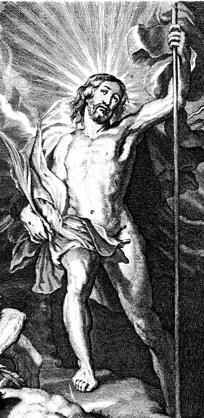From The life of our blessed Lord and Saviour Jesus Christ: An heroic poem: dedicated to Her most sacred Majesty. In ten books. Attempted by Samuel Wesley, rector of South-Ormsby in the county of Lincoln. Each book illustrated by necessary notes, explaining all the more difficult matters in the whole history: also a prefatory discourse concerning heroic poetry. With sixty copper-plates by Samuel Wesley. London : printed for Charles Harper, at the Flower-de-Luce, over against S. Dunstan's Church in Fleet Street, and Benjamin Motte in Aldersgate Street, 1693.
Passages telling the story of Mary Magdalene and her relation to Jesus
The Saviour's hastening to his journey's end.
Strong, and refreshed, to Olive's mount they go.
And thence survey the city stretched below.
Descending hence, among the trees they spy
Thy happy walls, delightful Bethany!
A village this, where Lazarus was lord,
Who often at his hospitable board
Regaled the Saviour and his faithful friends,
Nor could these friends, so near, neglect that door
Where mutual kindness filled each breast before.
With him two sisters now reposed in love,
And turned their faith and hope to things above.
Martha had long her brother's fortune shared
And made his interest her sincere regard,
Had lived sequestered with unspotted fame,
And cherished virtues which adorned her name.
But hapless Mary had at courts been bred,"
And trodden paths where pleasure's snares are laid;
There found her chastity a weak defense
Against those arts which murder innocence.
Her soul subdued by vanity and pride.
Soon lost that virtue which had been her guide:
Hence lust, ambition, each unholy guest,
And seven black demons seized her guilty breast.
These hell-bom fiends the Saviour chased away.
As mists are scattered by the rising day;
Recalled her soul by mercy's powerful charms,
From a deceiver's to a Saviour's arms.
Hence an illustrious penitent she proved ;
Her crimes were great, and much she wept and loved.
Thence from the court to Bethany she came,
To mourn and pray and spread her Saviour's fame;
Through grace divine she found her soul relieved,
And by her brother was with joy received.
Martha and Mary joined in one request,
And Christ, and his, to see their brother, pressed,
Who now beneath a mortal fever's rage,
Which no attempts could baffle or assuage,
Just gasped for life: for standing by his bed,
The stern physician shook his awful head;
Thence with slow steps in silence to the door
Walks, and declares his skill can do no more.
The pious sisters, overcome with grief,
Look round on all, soliciting relief;
But looked in vain for what no art can give.
To dry their tears, and make their brother live.
In this distress they called that Friend to mind
Whose powerful voice gave eyesight to the blind;
And sent a message, though it seemed too late,
To snatch their brother from impending fate,
To hasten Christ whose power alone could save
Him whom he loved from sickness or the grave.
Christ in reply forbade them to despair.
And ordered both to dissipate their fear, -
Told them that he who raging sickness proved,
Should spread the glory of the God they loved.
He, notwithstanding, his approach delayed.
And, though requested, at a distance stayed.
Till from his friend the parting soul had fled,
And his remains were lodged among the dead.
The funeral rites with due observance made,
And all just honors to his ashes paid;
His weeping friends to his sad house return,
Condole the sisters, and their losses mourn.
But while they poured their lamentations here,
The tidings reached them that our Lord was near.
Martha, on this, her godlike guest to meet,
Left her companions, and embraced his feet;
And while recounting their disaster, cried,
"Hadst thou been here, my brother had not died;
And even now, such is my faith's degree.
Ask what thou wilt, and God will give it thee."
The Saviour, struck with sympathetic pain.
Replied, "Thy brother shall revive again."
Attentive Martha listened to her Lord,
Then ran to Mary with his gracious word ;
But still her faith directed her to view
That final hour when all must find it true.
The mourning fair some pious Jews attend,
And praise the deeds of their departed friend;
Recount his virtues, his good actions tell.
And only sigh to live and die as well.
When these perceived that Mary went in haste.
They also rose, not knowing what had passed.
And fully bent to soothe the weeping pair.
Walked to the grave to pour their sorrows there.
Mary, whom Martha to the Saviour bore.
Fell at his feet as Martha fell before;
And prostrate there in plaintive accents cried,
"Hadst thou been here, my brother had not died."
The mournful group the general grief expressed,
And Jesus groaning wept among the rest:
The woes of man his tender passions moved;
He wept like man the loss of what he loved.
Again he wept, and asked where Lazarus lay,
Devoid of life, a sordid lump of clay.
Too well they knew the margin of the cave,
And showed the marble that concealed his grave.
With sighs suppressed, he heaved an inward groan,
And bade the people roll away the stone.
Martha, not yet perceiving his intent,
Anxious to please, yet willing to prevent,
Spoke, paused, lamented, hesitated, sighed,
"'Tis now so long, dear Master, since he died,
That putrid steams must needs infect the air,
Which neither thou nor these his friends can bear.''
Jesus replied, "Believe, and wonders see.
And humbly these events consign to me."
The stone removed, to Heaven he lifts his eyes.
And prays a while to him who formed the skies ;
Then turning boldly to the lifeless clay,
Before spectators in the face of day.
Lifted that voice which ancient silence broke,
That Heaven and earth might witness what he spoke;
Then, with that power which gave creation birth,
Pronounced augustly, " Lazarus, come forth ! "

|
The piercing accents entered death's dark bed,
And from its slumbers woke the trembling dead ;
Bound hands and feet, reviving Lazarus moved,
And asked assistance from the friends he loved;
These, while their looks astonishment betray.
Unloosed his fetters, and he walked away.
The gathering crowds with stupid wonder gazed,
Looked on each other, then on Christ, amazed.
A bursting joy from all exclaimed, "He lives
Dread Son of God," they shout again, "he lives ! ''
Upon his neck the ravished sisters fell.
And claimed almost another miracle
Them from their furious transports to revive,
Half dead with joy that Lazarus was alive.
Christ from the crowd immediately withdraws,
At once to escape his foes, and shun applause;
For in proportion to the good he wrought
The Jewish elders his destruction sought.
Hence to the wilderness a tour he made,
And found a shelter in the desert shade.
In pious deeds his happy moments spent.
And scattered miracles where'er he went;
He lived secluded till that day was nigh
When to redeem us he was doomed to die;
But then returned to suffer, and fulfill
The high commands of his great Father's will.
But ere the Saviour from these coasts retired,
Simon a friendly interview desired.
Simon had long through leprosy been blind
A shocking spectacle to all mankind -
Had lived secluded in a lonely cell,
Where shut from man infectious lepers dwell.
His foul disease had been so much abhorred
That all forsook him but our gracious Lord,
Who, through compassions most divinely great,
Had quite restored him to a healthy state.
Simon had now in splendid ease retired,
With every blessing that his soul desired;
And near Bethany, his father's seat.
Had cherished virtue on his own estate.
But while his riches in abundance flowed,
His heart with grateful recollection glowed;
Nor once forgot amidst increasing wealth
The great Physician who restored his health.
To Christ one eve he sent, and strongly pressed
Him, with his twelve, to be that night his guest ;
Told him a little banquet he'd prepare,
And Laz'rus and his sisters would be there.
To this request the Saviour, in reply.
Gave his consent, his wish to gratify;
For in his life we no mean stiffness see,
His heart was open, and his converse free ;
Life's lawful pleasures he vouchsafed to taste.
And all the virtues of both worlds embraced.
The guests, arrived, a summer parlour found,
Where Tyrian carpets overspread the ground.
Hangings as rich adorned the stately room,
The dear-bought work of Sidon's noble loom.
On these some figures drew the strangers' eyes,
Which in their breasts excited much surprise.
For full before them, as intent they gazed,
The fate of Sodom they distinctly traced;
And in the features which these colors bore,
It frowned almost as dreadful as before.
The workman's efforts so successful prove
That all the figures seemed to weep and move.
Here in a plain the flaming cities glow.
And there spectators into statues grow.
See there where Lot's apostate partner stands,
And backward throws her longing eyes and hands;
These eyes and hands, from whence warm life had fled,
The skillful artist marks as pale and dead.
Those cheeks which first a ruddy freshness show,
Fade while you look, and into paleness grow.
Part of her hair death seems in chains to bind.
And part appears to waver with the wind.
One foot seemed raised, resolved its load to bear,
And one seemed fixed by cogent fetters there.
Just half transformed, you viewed a double strife
'Twixt death's encroachments and expiring life.
Till by degrees she seems of breath bereft ;
And while you gaze, no more of life is left.
Yet in her face, fear, anger, pity, strive.
As skillful artists make their marbles live.
Not far before the good old man appears.
By angels hastened and his ruling fears -
The small remains of Sodom with him bears,
And moistens with his tears his silver hairs.
See them scarce lodged in little Zoar's walls.
Before from clouds the ruddy vengeance falls.
Big drops of flaming gold profusely spent,
The falling fire and brimstone represent.
See all aghast the criminals look pale
While flaming tides descend through Siddim's vale
With fearful shrieks they seem to pierce the sky.
And half persuade you that you hear them cry,
Or ask for mercy they despised of late
And mourn for their inevitable fate.
Above, some Hebrew characters bestow
This just reflection on the piece below:
"Learn, mortals, hence, by this example given.
To dread the wrath of sin-avenging Heaven.
Here fiery lust was purged with hotter fire, -
In flames like these Gomorrah's sons expire."
While here they, read old Sodom's fearful doom,
Martha and Mary to the banquet come.
Their twice-born brother every eye awakes
And all attention from the painting takes.
The modest youth a low obedience made,
And to his Lord a grateful homage paid;
Felt at his sight devotion warm his breast,
And all his soul in looks and words expressed.
Here on their seats each cheerful guest was placed,
Excepting Martha, who directs the feast;
And Magdalene, who fell with sighs profound,
And tears effused, in homage on the ground.
She with low rev'rence clasped the Saviour's feet,
Nor left that station but with much regret;
With deep contrition smote her heaving breast.
As though unworthy of the ground she pressed.
With her some costly essences she brings.
Which would have raised her in the eyes of kings.
When all her charms were dressed and spread to please
Abandoned man, who seeks licentious ease.
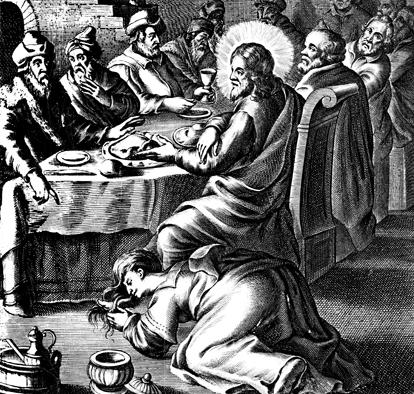
|
And all Arabia scatters round the room;
While from her eyes distils a grateful shower.
And flowing tears a richer fragrance pour.
Then with her ringlets, which, in curls displayed.
Had once for man delusive fetters made.
She wipes the sacred feet her hands embraced,
And spreads that essence some conceived a waste.
Iscariot said, "This cost had been employed
To better use if by the poor enjoyed."
Not that he felt the welfare of the poor,
His sordid aims were to increase his store;
For while pretending to afford relief.
His views were selfish - Judas was a thief.
Our Lord, who knew the workings of his mind.
Took up his speech just as it seemed designed;
And, to enlarge their too contracted sight,
Spoke of his exit to impart new light.
"This precious ointment, which, with too much haste.
Has been," he said, "by some imputed waste.
Against my coming funeral is designed,
A mournful truth which all will quickly find.
Then as my Gospel spreads, it shall be showed,
How Mary paid the gratitude she owed."
The sad apostles hear these painful words.
And every breast the prophecy records;
Yet none the anguish of his soul expressed.
Or asked the Saviour to unfold the rest.
That night at pleasant Bethany they stay.
But take their leave on the succeeding day;
Thence to fair Bethphage Christ his footsteps bends,
Where gathering crowds proclaim themselves his friends.
See there the height to which his soul aspired!
See there the pomp which Salem's king desired!
On him no horse, no liveried servants wait,
To grace his triumph in a car of state.
A servile ass sustains th' incarnate Lord,
By angels worshiped, and by saints adored.
Hence Rome's proud pontiff may this truth discern.
That he from Christ ambition did not learn.
The great, unknown, tremendous mystery.
And now they find that 'twas resolved on high
That Christ, the maker of the world, must die; -
That in the Triune council 'twas decreed,
A sinless God for sinful man must bleed;
His injured Father's wrath atone and bear,
And rescue rebel mortals from despair.
Complete the number of the heavenly host.
And fill those seats apostate angels lost
Silence profound all Heaven awhile possessed,
And awful wonder not to be expressed.
Their arms they drop, their harps again they try;
New songs are heard, and wonted harmony.
Sweet Muse, return, and hover on the wing.
Around thy bleeding, thy anointed King I
Go weep like Magdalene before he died.
And say, like her - "My Love is crucified."
Go bathe his wounds, as that repenting fair
Once bathed his feet, and wiped them with her hair.
For all the follies of thy youthful days.
Ignobly spent in mortal beauty's praise;
For robbing Jesus of his just esteem,
For all thy broken vows to Heaven and Him ;
For all thy sloth, thy vanity and pride:
See what they cost, "thy Love is crucified?"
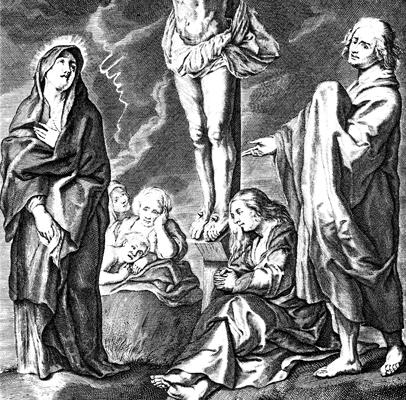
|
Jesus is crucified as his mother Mary, Mary the wife of Clopas, Mary Magdalene, and the disciple whom he loved watch. |
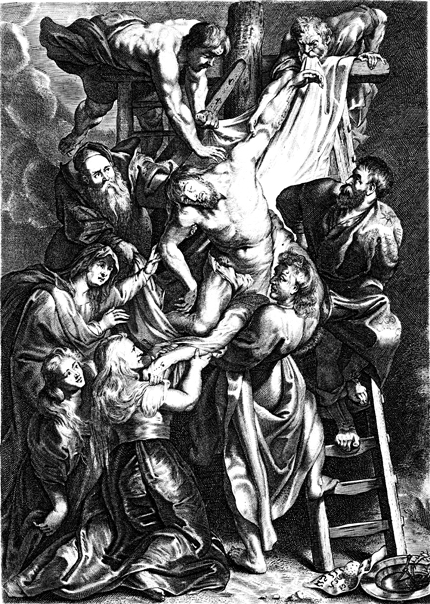
|
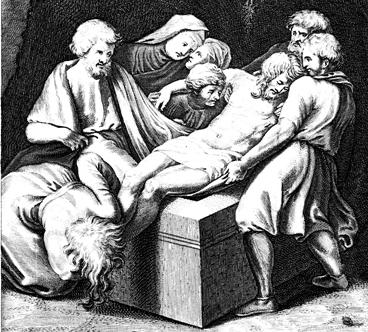
|
Before the sun fair Magdalene arose.
Who to the tomb with aromatics goes ;
Resolved to rescue from the putrid grave.
And fill with unguents, him she meant to save.
The same kind office also thither drew
Her female friends who her intention knew;
These met together: though their fears were strong,
Their love was stronger, and they walked along.
At length with various painful doubts they come,
And reach the garden which contained the tomb.
On their approach, an unexpected fear
Started at once, and much perplexed them here.
They recollected that a ponderous stone.
Beneath whose weight five times their strength would groan,
Had been procured, and, placed before the cave.
Secured the passage to their Saviour's grave;
And ere they reached it, each presumed to say
'What powerful hand shall roll the stone away?'
The doubtful Jews, when Jesus was interred,
To mar predictions they had often heard,
Their recent actions from reproach to save,
And blast his credit in the silent grave,
(For guilt suspects) had placed a Roman guard
Around the sepulchre: with labour hard
They brought that ponderous stone which Christ immured,
And by a seal their whole design secured.
By this they aimed to ratify his doom,
And thus forbid him to escape the tomb.
For Christ had said, "The third auspicious day,
Life shall revive this uncorrupted clay."
They knew his word had others raised; nor yet
Could they the power which Lazarus felt, forget,
Or Nain's youth; nor were their fears in vain,
Nor longer Hades could his soul contain.
A conqueror thence he rose where late he fell.
And dragged in chains of triumph death and hell.
That hour arrived when nature must obey
Her sovereign Lord, he willed the stone away.
The Saviour risen, his unrivaled care
Stationed two bright attendant angels there,
Those early pious pilgrims to console
Who with mistaken tears his loss condole.
Their trembling feet no sooner had they set
Within the garden, than strange scenes they met
The earth convulsed was trembling where he lay,
And frightened nature felt more pangs than they;
The yielding air some unknown powers divide,
And flitting forms seemed brushing by their side.
On their approach the guards celestial stand.
And with due honours range on either hand;
As on the sight of earthly majesty
A lane is made till all the pomp goes by.
A heavenly youth before these women went,
Whose lovely presence heightened the event;
From the cave's month he rolls the mighty stone,
From whence before our conquering Lord was gone;
He rolls it, and triumphant sits thereon.
The Roman soldiers, foreigners to fear,
Sustained their stations till his form drew near;
Then made some effort to resist, and fain
To draw their swords they strove, but strove in vain;
Their foe was heavenly, and in vain they rear
Their useless piles, suspended in the air.
Fear seized their souls, their hands disarmed they found.
And all their armour clanks against the ground;"
Their bodies trembled, and their courage fled,
And in some moments all appeared as dead.
The lovely Seraph with a calmer air
Turned to the women to dispel their fear;
Laid by his frowns, in mildest accents spoke.
And in these words the morning silence broke:
"Why should you fear, since Heaven, with all its
powers,
Guards whom you seek - your suffering Lord, and
ours?
Why should you pierce this melancholy shade
Or idly seek the living with the dead?
Dismiss your griefs, nor let these tears deplore
Your Saviour God, who lives to die no more.
Did not he promise the third day to rise?
Could Christ deceive? Advance, and trust your eyest
See the cold cavern where he lay - see there
The linen clothes and empty sepulchre.
Convinced by these, with expedition go,
And to your friends the happy tidings show."
With joy and trembling the fair group retire,
Anxious to know, yet fearful to inquire.
Courageous Magdalene resolved to stay,
While to their friends the others haste away.
She, all intent her much-loved Lord to find.
Wanted his presence to console her mind -
Her mind, which struggling thoughts like earthquakes
move.
Tortured at once with hope, and doubt, and love.
Angelic witness she could scarce receive;
The tidings seemed too glorious to believe.
With eyes half-closed, or fixed upon the ground,
With thoughts absorbed in subjects most profound,
She heard some sound, and saw a form appear,
Which she imagined was the gardener near.
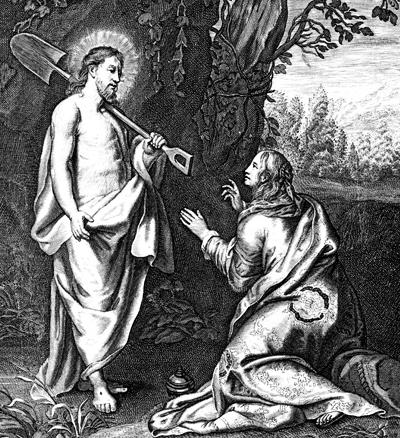
|
She, as he came, suppressed the rising sigh.
And wiped the tear that started from her eye,
Then thus began - "If thou hast carried hence
The poor remains of murdered innocence,
Tell me in pity where his limbs are laid.
For my last sighs and tears are yet unpaid
There I" - The Saviour could no longer bear,
But in her pangs sustained an equal share;
Around his temples beamed some sacred rays,
And in his face she saw the Godhead blaze.
Her honoured Lord she recognized and knew,
And at his feet herself in transports threw ;
And, feeling joys too vast to be expressed,
"Master," she cried, and spoke in looks the rest
Her Lord salutes her with his radiant eyes,
And adds in words - "Suspend thy ecstasies.
Go, tell my brethren that I hold them dear.
Though partly sunk in unbelief and fear ; "
And having charged her this request to bear.
Glides ftom her sight in fields of trackless air.
When she arrived and told what she had seen,
All were incredulous as she had been;
They thought the vision by her fancy made.
Or conjured up by some delusive shade.
Yet quite alarmed with such uncommon news.
They half acknowledge what they half refuse ;
And in this strait resolved to ascertain
A fact which none were able to explain.
John, while the others much attention lend.
Seemed most concerned, as Christ was most his friend.
Cephas stood next, who, rising from the fall,
In faith and courage seemed a spur to all:
Thus broken bones, by skillful artists dressed.
And set again, grow stronger than the rest
Warm zeal and friendsliip these disciples bear
In a few moments to the sepulchre.
On entering here they could no body find,
But saw the linen which was left behind,
The spice with which the Jews embalm their dead,
And blood-stained napkin taken from his head;
Which in close folds was in a comer placed:
A work confessing neither fear nor haste.
On seeing these they could no longer mourn,
But both in triumph to the rest return.
They come with speed, but gained no credit here;
For all were filled with terror and despair.
A cloud of grief brought on a mental night,
Which left the whole without one gleam of light.
Their sun seemed set, which they in groans deplore,
Yea, set in death's dark shades to rise no more
The doors were shut, lest the malicious Jews.
Should the apostles, as their Lord, accuse
Of crimes unknown: hence all in silence were;
And sighs suppressed but gently moved the air:
Their only light, one taper's glimmering ray,
And this was hidden, lest it should betray.
Amidst this gloom, an unexpected sight
Appeared before them in a flood of light;
The form was human, but the air and dress,
And bright celestial light, the God confess.
He looked divinely, did divinely move;
His voice was heavenly, breathing peace and love.
His wond'rons words, which life and light convejred.
Resembling those by which the world was made;
Reviving vigour through their spirits sent,
And struck new gladness whereso'er they went.
He mildly chides their unbelief and fear,
And shows those wounds made by the nails and spear ;
And their conviction fully to complete,
Of their provisions condescends to eat
Christ, having banished thus their doubts and fears.
Breathes peace into their souls, and disappears.
Andrew Roberts likes to hear from users:
To contact him, please
use the Communication
Form

Headings
